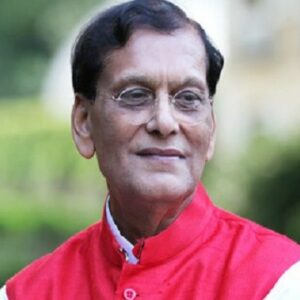Bindeshwar Pathak is an Indian social reformer who formed Sulabh International, a non-profit that promotes human rights, environmental cleanliness, non-conventional energy sources, waste management, and social changes. He has received numerous national and international accolades for his pioneering work, particularly in the subject of sanitation and hygiene. He was born into a Brahmin family in Bihar, India, and grew up witnessing abuse and discrimination towards those from the so-called “lower” castes. He joined the Bihar Gandhi Centenary Celebrations Committee’s Bhangi-Mukti (scavengers’ liberation) Cell as a young college student, which introduced him to the condition of India’s scavenging community. He was so disturbed by the incident that he decided to do something about it and founded the Sulabh International Social Service Organization. It was a social initiative to end the degrading practice of manual scavenging while also providing inhabitants with sanitary toilet facilities and long-term trash management. He invented the Sulabh Shauchalaya System, a two-pit pour-flush toilet that has been designated as a Global Best Practice by UN-HABITAT/UNCHS (United Nations Centre for Human Settlements). He has also made significant contributions to bio-energy and bio-fertilizer, liquid and solid waste management, and poverty reduction.
Childhood and Adolescence
Bindeshwar Pathak was born in Rampur Baghel village in Bihar, India, on April 2, 1943, to Rama Kant Pathak and his wife, in a typical upper-class Brahmin family. He was raised in a traditional manner, as is customary for boys of his social standing.
His grandmother chastised him when he was six years old for touching a scavenging lady, who was then considered untouchable. He was forced to drink cow dung and urine before being washed in holy Ganges water. He has seen numerous examples of scavengers being discriminated against and degraded over the years.
In 1964, he earned a bachelor’s degree in sociology. He wanted to be a lecturer as a student, but he didn’t get enough marks in his university examinations to make his ambition come true. He worked at a variety of professions throughout the next few years, but he couldn’t seem to find a career that suited him.
He got a brief writer’s employment with the Mahatma Gandhi Centenary Celebration Committee in Patna in the late 1960s and joined the Bihar Gandhi Centenary Celebrations Committee’s Bhangi-Mukti (scavengers’ liberation) Cell. He developed a better appreciation of the humiliation and hardship of India’s millions of manual scavengers during this time.
Later the Years
In 1970, he founded the Sulabh International Social Service Organization after being deeply stirred by the demeaning practice of manual scavenging. He had also devised the technology for a two-pit pour-flush toilet (known as Sulabh Shauchalaya) that could be easily constructed in Indian communities by this time.
Over the years, the idea grew in popularity, and in 1973, he had a chance to meet with a municipal officer in Arra town, who granted him Rs 500 to construct two public toilets. This acted as a spark, and several more toilets were quickly constructed throughout Bihar. The toilet system extended to adjacent states, relieving thousands of manual scavengers from their degrading jobs.
In 1974, Pathak implemented a pay-per-use system for maintaining community toilets and baths. The Sulabh toilets became so popular in releasing scavengers within a few years that the Ministry of Works and Housing of the Government of India, in partnership with the WHO and UNICEF, conducted a national symposium in Patna in 1978 on bucket latrines conversion and scavenger emancipation.
His research on “Liberation of scavengers through Low-Cost Sanitation” got him a master’s degree in 1980 and a PhD in 1985 from the University of Patna.
With the help of the Government of India and the Bihar State Scheduled Castes Development Corporation, he began a training and rehabilitation program for the wards of scavengers in various skills such as shorthand, typing, motor driving, mechanics, masonry work, carpentry, and so on in 1985.
He worked to improve the social status of the scavenging community in the 1990s. Sulabh conducted a ‘National Seminar on Scavenger Liberation and Rehabilitation’ in 1992, encouraging people to become more conscious of false beliefs and prejudices. The Sulabh International Museum of Toilets opened in 1994 with the goal of educating the general public about the evolution of toilets over time.
Sulabh expanded its operations to include women’s empowerment in 2001, and a country-wide initiative for women’s participation in sanitation, health, and hygiene was launched. In Alwar, Rajasthan, a vocational center was established in 2003 to train women in tailoring, embroidery, food processing, and beauty treatments.
Sulabh introduced a unique and practical technology in 2002 to remove color, odor, and pathogens from biogas plant effluents. Sulabh Effluent Treatment (SET) is a technology that makes effluents safe and acceptable for agriculture, aquaculture, or safe disposal into a river or any other water body.
Sulabh coordinated the World Toilet Summit–2007 in partnership with the World Toilet Organization (WTO), which drew representatives from 44 countries. Following the discussions, the Delhi Declaration for a Cleaner World was produced.
Major Projects of Bindeshwar Pathak
Sulabh International, which is now India’s largest nonprofit organization, was founded by Bindeshwar Pathak. The organization advocates for sanitary and long-term sanitation, as well as human rights, non-conventional energy sources, waste management, and social reforms through education.
Achievements & Awards
In 1991, the Indian government honored him with the Padma Bhushan award for his humanitarian efforts.
He’s also won the Energy Globe Award, the Dubai International Award for Best Practices, and the Indira Gandhi Priyadarshini Award for Environmental Protection.
He received the Stockholm Water Prize in 2009.
The Mayor of New York announced April 14, 2016, to be “Dr. Bindeshwar Pathak Day.”
Personal History and Legacy
In 1965, Bindeshwar Pathak married Amla. The couple is the parents of three children.
Estimated net worth
The estimated net worth of Bindeshwar Pathak is unknown.


